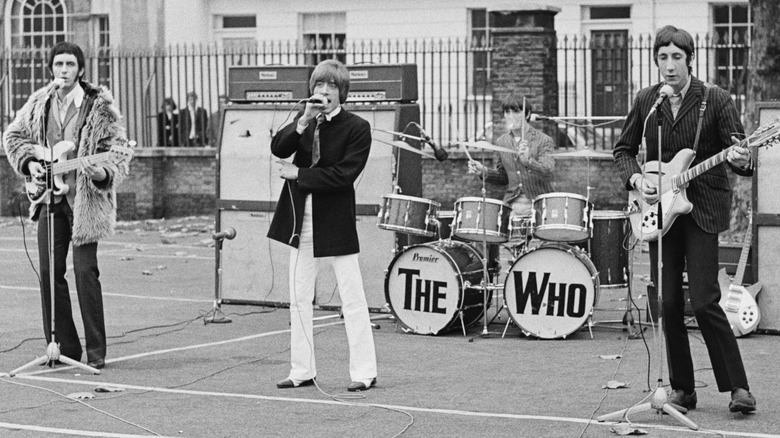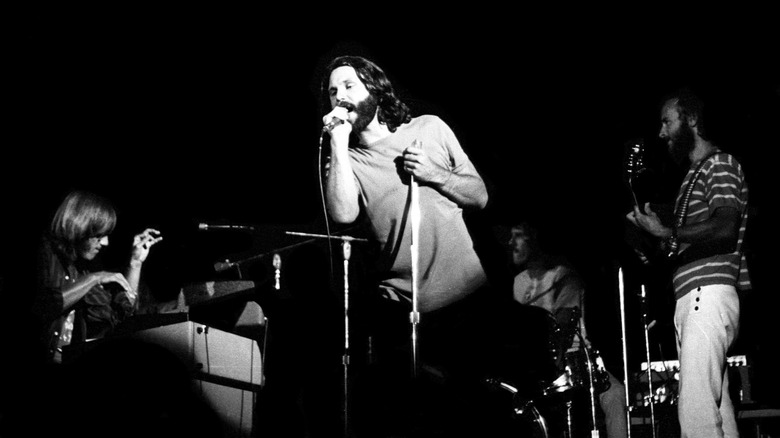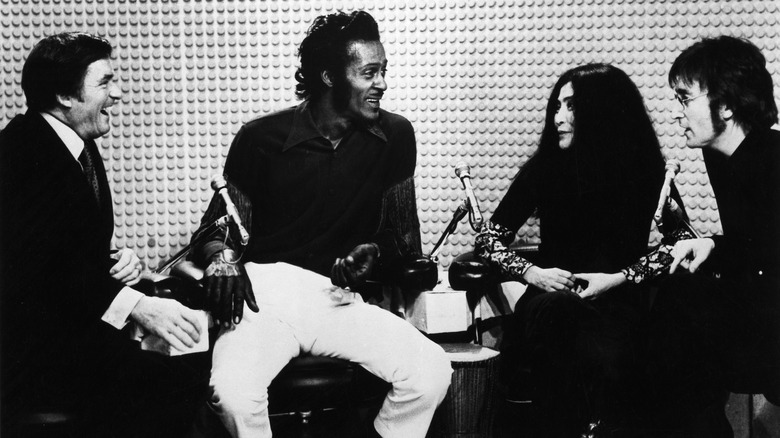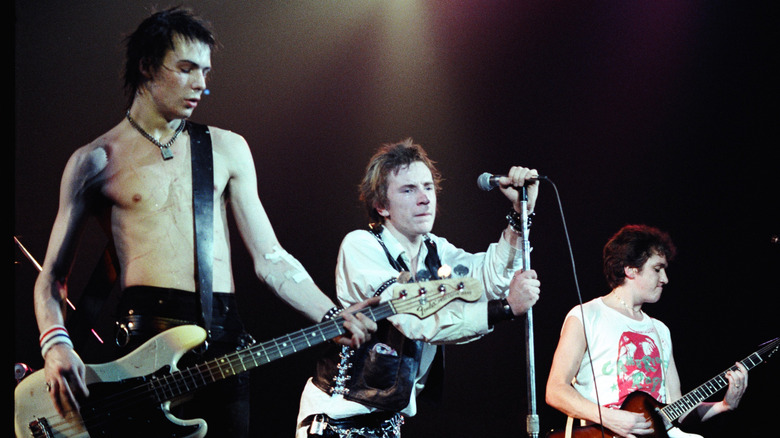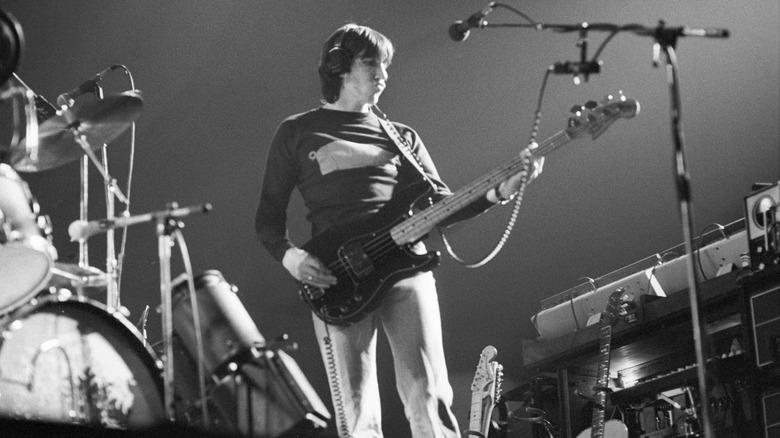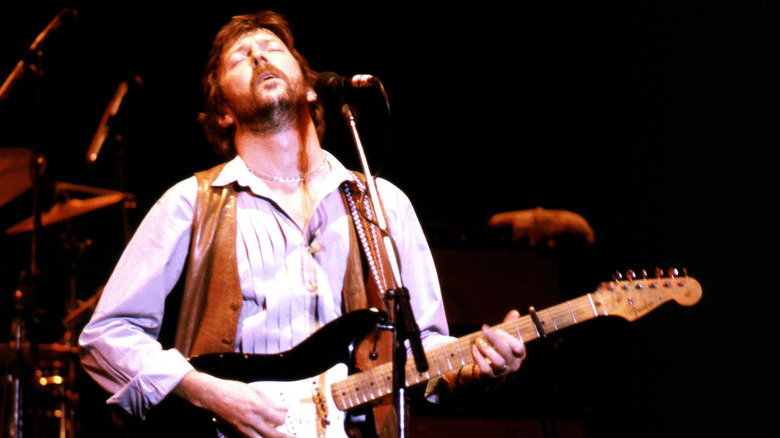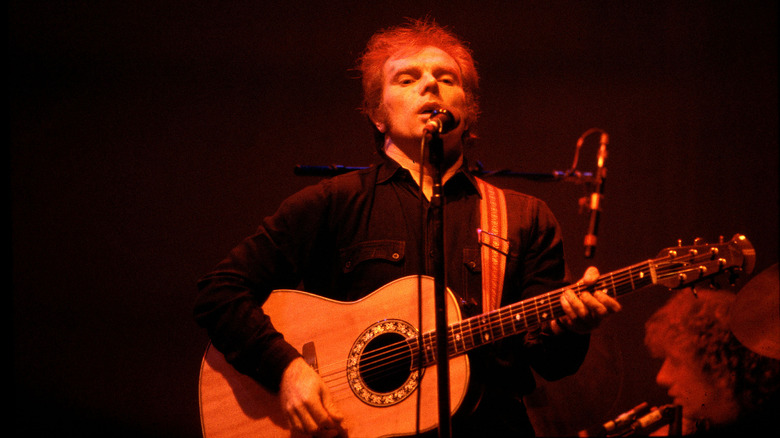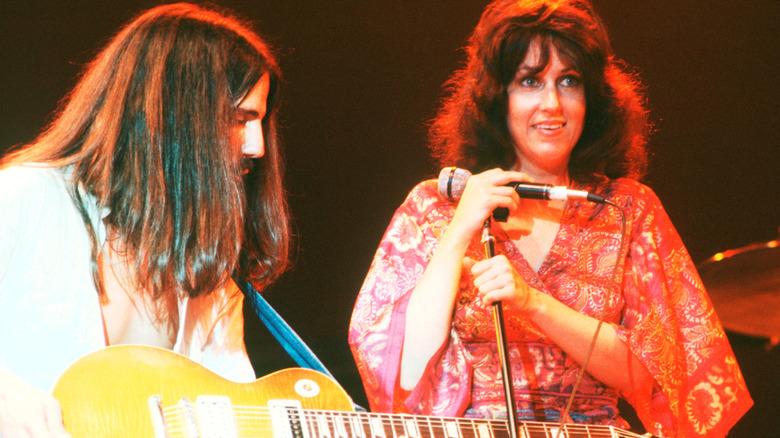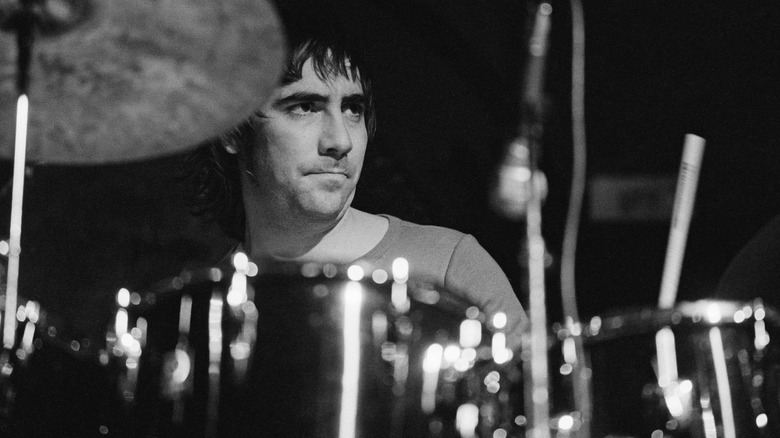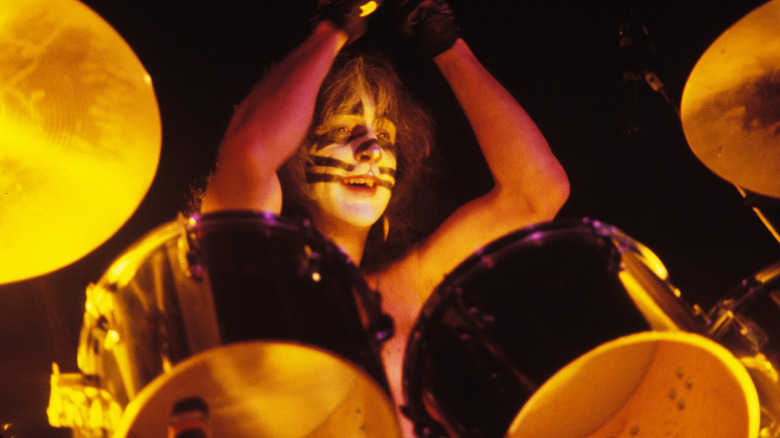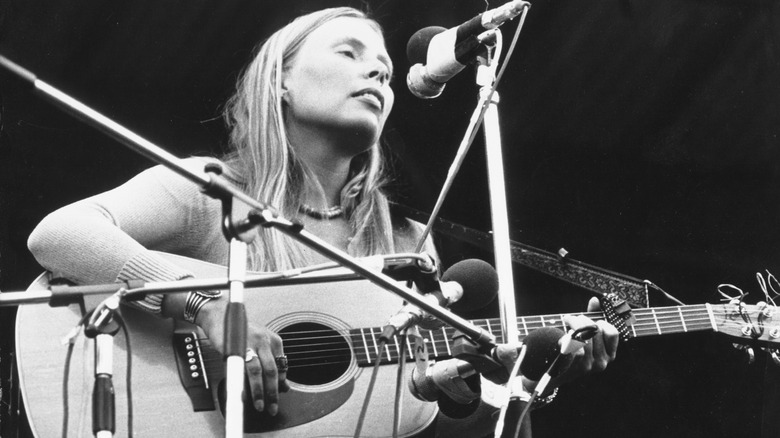The Worst Concert Performances Of The 1970s
The 1970s remain regarded as one of the best and most influential eras for music. Think about these names for a second and let them truly sink in: Queen; Pink Floyd; Led Zeppelin; Black Sabbath, and ABBA. These are easily five of the greatest musical acts of all time, and they were all active in a decade with so many more incredible artists around them, which pushed everyone to be better. Listeners and concertgoers were spoiled for choice, never being short on quantity and quality to have the time of their lives.
That isn't to say that the decade was flawless. Not at all. For every outstanding show, there was another that could be considered one of the worst concert performances of the 1970s. At times, it could be due to one band member not clicking on the day, or on some occasions the entire group falling flat. Whichever way, fans often remember these gigs for the wrong reasons — mostly because they would want their money back if they paid for a ticket.
So, let's take a walk down memory lane to relive some of the most infamous concerts from the 1970s and what went wrong. But hey, just remember an important thing here: One bad day doesn't define a legacy. An act may have had a rotten performance or failed to put their best foot forward, but that doesn't mean they're terrible and should be seen as failures. We're all allowed to have off days at the office, so don't judge too harshly.
Jim Morrison's last performance with the Doors was memorable for the wrong reasons
One of the biggest rock and roll tragedies of the 1970s is the death of the Doors singer Jim Morrison. A gifted musician, he died far too young at the age of 27 in 1971. The sad part is that his final show with the band, at the Warehouse in New Orleans in 1970, proved to be one of his worst performances ever.
The wobble hit about midway through the set, as an intoxicated Morrison struggled to recall the lyrics to the songs he had written. The vocalist attempted to make a joke about it, but the crowd was neither biting nor laughing along with him. Ironically, the tension boiled over and erupted during one of the Doors' most classic songs, "Light My Fire." According to the attendees, Morrison balanced himself by hanging onto his mic stand throughout the song. When it came time for the musical solo, Morrison sat down on the drum riser for a breather. His job wasn't done, though, since the final verse of the song required his vocals, but Morrison didn't budge from his position. Drummer John Densmore attempted to draw his singer's attention by giving him a light kick, but all this did was enrage Morrison, who proceeded to wreck the mic stand and storm off stage.
This wasn't the first time that Morrison had displayed erratic behavior, and at this point, the rest of the Doors had had enough. The band broke up afterward.
Chuck Berry, John Lennon, and Yoko Ono's performance had everyone bewildered
When people think of the history of rock, Chuck Berry needs to be in contention for being the pioneer of the genre. From "Roll Over Beethoven" to "Johnny B. Goode," Berry created iconic songs that influenced generations of musicians and encouraged others to pick up a guitar, and so much so that some believe that the Beatles ripped off Chuck Berry.
In 1972, Berry collaborated with former Beatle John Lennon and his wife, Yoko Ono, on "The Mike Douglas Show." The allure of the performance had the audience on tenterhooks because both Berry and Lennon were seen as music icons. Ono was also a musician, but she had an eccentric quality to her vocals that didn't exactly appeal to the mainstream.
The performance started off great as Lennon and Berry played Berry's "Memphis, Tennessee." In fact, there was a welcome synergy between the pair as they played off each other. However, it went pear-shaped when Ono chimed in with her wails. In what's now become a viral meme, Berry's eyes widened as he heard Ono's shrieking voice and threw him off. A sound engineer turned down Ono's vocals in the mix, likely because they saw Berry's reaction and recognized how jarring Ono's additions were to the track. While Berry recollected himself and continued the song like a pro, there's no denying that Ono's vocals didn't complement the song. Maybe she should have sat this one performance out.
The Sex Pistols' final US tour show was one for the ages
In 1978, the Sex Pistols hit America for their first tour. It wasn't a good time for the band, though. Bassist Sid Vicious had well-publicized addiction issues, singer Johnny Rotten wasn't getting along with his bandmates, and the group's manager, Malcolm McLaren, had decided to book them on a tour of the Bible Belt, hoping it would drum up some publicity for the band.
As drummer Paul Cook told "Rockonteurs with Gary Kemp and Guy Pratt," it was almost too controversial, as they had sheriffs at every show and had bottles and pigs' ears flung at them during performances. By the final stop at the Winterland Ballroom in San Francisco, the tour had taken its toll on the band. "Everyone was beat by then, really," Cook said. "And we just wanted to get it over with and get out."
Despite 5,000 people showing up for the event, everything went wrong on the night. "At Winterland, I had a cold," guitarist Steve Jones said in Jon Savage's book "England's Dreaming" (via Rolling Stone). "Sid wasn't playing a note, and he wasn't even plugged in half the time. Me and Paul just wanted to play. I kept cutting out, strings breaking left, right and center." Rotten's voice also cracked, before toward the end of the show he turned to the crowd and said, "Ever get the feeling you've been cheated?" He walked off stage, and the band broke up afterward.
Pink Floyd didn't have a good time in Montreal
In July 1977, Pink Floyd played a big show at the Olympic Stadium in Montreal, Canada, to an estimated audience of between 80,000 and 100,000 people. However, trouble brewed between the band and a group of instigators at the front of the stage. Before the show had even started, these folks heckled and booed Pink Floyd, and it only worsened after the band began their set.
It also didn't take too long for the troublemakers to start throwing firecrackers at Pink Floyd while they played. This would have annoyed any musician, and Roger Waters was no different as he went off on an expletive-laden rant against the perpetrators. There was a legitimate concern that the band could walk off stage, but they continued to play. A roadie reportedly caught one of the people who had been throwing firecrackers and brought him up onto the stage, where Water proceeded to spit in his face. Yet, the hostile atmosphere didn't dissipate after this, and the performance continued with the band playing like they were on edge for the rest of the show.
In this case, the reason for Pink Floyd having one of the worst concert performances of the 1970s wasn't due to them. Instead, it's because of a few rowdy individuals who decided to ruin the experience for everyone else. At least the event served as inspiration for the band's seminal album, "The Wall."
Eric Clapton's racist rant sparked a movement
Eric Clapton is regarded as one of the finest guitar players of all time. Indeed, Rolling Stone listed him as the second-greatest guitarist of all time out of 100 of his most famous peers. Despite all the accolades and plaudits for his undisputed talent, there's one moment that ruined Eric Clapton's career, and it was all his own doing.
In August 1976, Clapton performed at the Odeon in Birmingham, England, but what was meant to be a night of great music and good vibes took a sharp downward turn into something far uglier. According to reports, an unprompted and intoxicated Clapton spat out a vile and racist rant about immigrants in the United Kingdom. The performance wasn't recorded, so the exact nature of what Clapton said relied on the accounts of those who were in attendance, which have since been widely reported. According to English Beat's David Wakeling (via Rolling Stone), Clapton went off about how England would turn into "a colony within 10 years" and urged the "foreigners" to leave, amidst a flurry of repugnant racial slurs.
Speaking about the incident, Wakeling explained how the crowd became shellshocked by Clapton's tirade. "As it went on, it was like, 'Is this a joke?'" Wakeling said. "And then it became obvious that it wasn't ... It started to form a sort of murmur throughout the crowd. He kept talking, and the murmurings started to get louder." Clapton never denied his comments.
Van Morrison walked off stage after four songs
Another musician who has performed with Eric Clapton, even teaming up for an anti-lockdown protest song during the COVID-19 pandemic, is Van Morrison. The singer has been around for numerous decades, but most people remember him for his famous song "Brown Eyed Girl."
Despite being a seasoned performer in the music industry, Van Morrison experienced stage fright from time to time. In 1976, at the Band's farewell at the Winterland Ballroom in San Francisco, Van Morrison almost didn't make it out on stage due to cold feet. It took his manager actually shoving him onto the stage to perform, though fortunately, the performance went off without a hitch.
The same can't be said about a New York concert in September 1979. According to New Age magazine's Stephen Davis, who was in attendance, Van Morrison only lasted four songs before departing the stage to the bewilderment of the audience, who didn't know what happened. It was something of a trend with Van Morrison, since the concertgoers never knew if they'd be treated to a sensational performance or if he'd storm off stage. Sadly, New Yorkers didn't receive the best of Van Morrison when he stopped by that fateful day in the late '70s.
Grace Slick's last German show with Jefferson Starship was bad and offensive
Born out of the ashes of Jefferson Airplane, Jefferson Starship became a fixture of the 1970s, with people wanting to hear and see more of the rock band's unique music. Yet, a tour of Germany in 1978 likely put off more than a few German fans for good.
Jefferson Starship missed out on the Wiesbaden leg of the tour because vocalist Grace Slick fell ill. However, Slick and the crew went ahead with the concert the next night in Hamburg, which was probably an unwise decision, in retrospect. Before the show, Slick drank heavily to the point where she shouldn't have been on stage. Once she made her way out, Slick prattled off at the German fans, evoking memories of World War II, calling them Nazis, and doing Nazi salutes. The concert was filmed by the German music television show "Rockpalast," but unsurprisingly, it never aired on TV due to Slick's shocking behavior. Slick left the band after the incident, but she would rejoin Jefferson Starship a few years later.
"That's what that night was about: dumb, drunken decisions," Slick said about the show in Jeff Tamarkin's "Got a Revolution! The Turbulent Flight of Jefferson Airplane" (via Ultimate Classic Rock). "So, [the crowd] started walking out, but they kept coming back, like: 'Maybe she'll do something really hideous and we will have missed it.' A freak show."
The Who's Keith Moon needed to be carried off stage twice
In November 1973, the Who rolled into the San Francisco Cow Palace during the first leg of their American tour. The building was packed as the crowd waited to see one of the biggest rock bands of the era, which also featured notorious drummer Keith Moon, who'd developed a bad reputation in the music world for his antics. That evening proved to be one of Moon's most infamous performances for all the wrong reasons.
The details remain murky about exactly what Moon took beforehand, but the general belief is that he ingested a form of elephant tranquilizer before the gig. By the time he went on stage, Moon's playing was all over the show. However, that wasn't the worst of it, as the drummer stopped playing halfway through a song and collapsed backward, passing out. Moon awoke backstage and received a cortisone shot, and was adamant he wanted to continue playing the show. Again, the same result occurred, as he blacked out and needed to be carried backstage.
It was a trainwreck of a performance as the Who tried to find someone to fill in on drums, even asking the concertgoers in attendance if anyone could help out. The only person who must have had the best night of their life was Scott Halpin — a fan from the audience — who went on stage to help the Who finish their gig.
KISS's Peter Criss forgot the words to the song he wrote
KISS was one of the most important rock bands of the 1970s. While most people remember Gene Simmons and Paul Stanley as the de facto leaders of the flashy group, all members of KISS contributed to the music. In fact, it wasn't unusual for the different bandmates to actually sing the songs they wrote, even if they weren't the designated frontmen of the band. For example, the popular ballad "Beth," from the 1976 "Destroyer" album, was written and sung by KISS drummer Peter Criss, aka the Catman.
During a show in 1979, Criss received the opportunity to step away from his drum kit and belt out "Beth" to the audience. There was one problem, though: The Catman was reported to have been drinking heavily before the show, so by the time it came to perform "Beth," he had forgotten the words to the song he'd written. Unfortunately for Criss, video recordings of his performance exist, and it's as cringeworthy as one can imagine. A year later, Criss was gone from the band, but whether he was fired or quit depends on who's answering the question. Criss would return to KISS years later, then leave once again.
The Isle of Wight festival was a complete nightmare
The Isle of Wight festival in 1970 looked like the place to be. It featured a lineup of incredible performers, such as Joni Mitchell, Kris Kristofferson, Jimi Hendrix, Sly and the Family Stone, the Who, and the Doors. The ambitious festival attracted over 600,000 people who camped and partied to the best of the best of the era, in what should have been one of the most memorable gigs of all time.
However, a combination of crowd behavior and poor logistics soured the experience for many performers. Kristofferson, for example, was booed off stage because of his track "Blame It on the Stones," which was believed to be a slight against the Rolling Stones since the audience couldn't hear the song's lyrics properly over the PA system. Mitchell also received a chorus of boos, and she was interrupted by a protesting hippie during her set.
Sly and the Family Stone abandoned their set after a concertgoer chucked a can that hit the group's guitarist, Freddie Stone, while the Doors' set wasn't exactly revered either. Even though there were musical highlights for various musicians, this wasn't exactly the best rock festival of all time, which it had every right to be based on its lineup.
